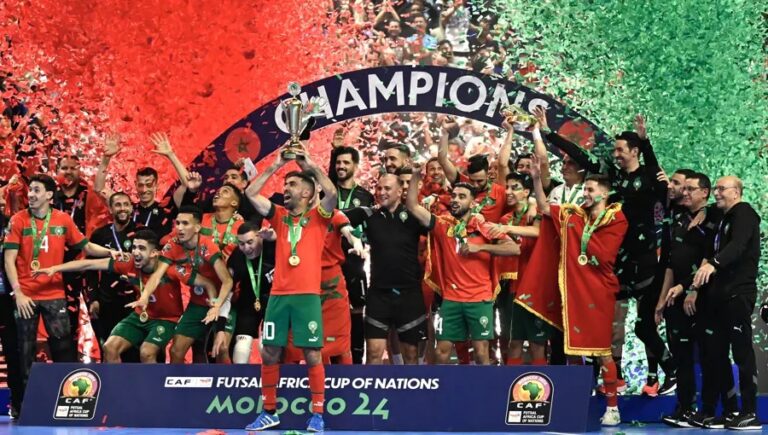While futsal tends to have a greater prominence in countries with warmer climates such as Brazil and Argentina, where the persistent heat throughout the year prevents the growth of football-friendly grass on 11-a-side grassroots pitches, forcing aspiring footballers to take to the courts and streets to practice their skills, we don’t tend to hear much about the African nations’ relationship with futsal.
It is no secret that many parts of Africa are melting pots of footballing talent. It is a continent that has produced dozens of world-class players, such as Yaya Toure, Samuel Eto, and Dider Drogba, who’ve helped their clubs to the biggest prizes in European club football.
Meanwhile, the football African Cup of Nations is a month-long spectacle demonstrating the unrivalled love and passion that the continent has for the game. So, with many African countries dealing with the same climate conditions as Brazil, which make it equally difficult to grow luscious green grass, why do we not hear much about the continent’s futsal success?
The continent’s most successful futsal nation, Egypt, have made six appearances at the FIFA Futsal World Cup, but never progressed further through the tournament than the quarterfinals. Similarly, Morocco, widely considered as the second most successful futsal country in Africa, have only made it out the group stages of a FIFA Futsal World Cup on just one singular occasion.
What prevents african nations from competing with the likes of brazil and spain in fifa futsal world cups?
While in football World Cup’s, we may not usually pick an African nation as the favourites going into a tournament, they are certainly competitive and capable of upsetting some of the world’s footballing superpowers.
Morocco, for example, reached the semi-final of the 2022 FIFA World Cup in Qatar, while Cameron, Senegal, and Ghana are no strangers to reaching the later stages of the tournament. But this trend doesn’t seem to translate to futsal.
For many football federations in Africa, futsal being used as a mechanism to enhance player development is only just being discussed. African nations don’t have the same benefit of having a long cultural history with the court-based sport as many South American nations and so are always playing catch up.
However, the sport is now growing in popularity and awareness in Africa. Morocco have registered interest in hosting one of the upcoming FIFA Futsal World Cup’s, Angola have made plans to launcha professional futsal league, and Uganda, who do not yet have a national futsal team, are prioritising incorporating futsal sessions into their young players training regime. There is certainly hope that futsal can grow dramatically across the continent in the coming years.
How do african nations qualify for the fifa futsal world cup?
The Futsal African Cup of Nations serves as both the continent’s major tournament and a qualification campaign for the proceeding the FIFA World Cup.
Since its formation in 1996, only three nations have lifted the trophy: Egypt, Morocco, and Libya. Three of the seven Futsal African Cup of Nations finals have been played between Morocco and Egypt, and Libya’s 2008 triumph over Egypt represents the only occasion where a country other than Morocco or Egypt has won the tournament.
While Egypt and Morocco dominate the competition, it represents so much more than simply attaining silverware. Among the ten teams that participate in the Futsal African Cup of Nations, the three highest performing (the winner, finalist, and winner of the third-place play-off) qualify for the FIFA Futsal World Cup.
For African futsal players, it represents an opportunity to travel to different cultures, play against the best players and nations from South America, Europe, and Asia, while gaining exposure to scouts who may have interest in signing them to one of futsal’s elite leagues.
Across the competition’s 28-year lifespan, only seven different nations have ever finished in the final three of the competition to qualify for the FIFA World Cup:
- Morocco, Morocco (six WC appearances)
- Libya (four WC appearances)
- Angola (two WC appearances)
- Mozambique, Ghana, and Zimbabwe (one WC appearance).
But what happened in the 2024 Futsal African Cup of Nations and which nations will be heading to the FIFA World Cup in Uzbekistan this Autumn?
Africa’s three nations heading to uzbekistan’s 2024 fifa futsal world cup
The recently completed 2024 African Cup of Nations, hosted in Morocco, saw the ten nations split into two groups of five, with the top two teams of each group entering the semi-finals.
- Morocco and Angola would come out on top in Group A, while Group B saw Egypt and Libya finish in the top two to head to the semi-finals.
- Angola pulled off an impressive 7-3 victory over Egypt to reach their second successive African Cup of Nations final, while Morocco eased to a resounding 6-0 victory over Libya.
- Libya edged past Egypt on penalties after a tight 2-2 draw in the third-place play-off to book their place at the 2024 FIFA Futsal World Cup.
- Hosts Morocco won their third successive African Cup of Nations after defeating Angola 5-1 in the final. So, the three nations heading to Uzbekistan will be Morocco, Angola, and Libya.
Can morocco cause a shock at the 2024 fifa futsal world cup?
Having only picked up their first major honour in 2016, Morocco has emerged as the dominant force in African futsal over the past decade and will be hoping to compete with some of the world’s best at this Autumn’s FIFA World Cup.
There’s evidence that they’re improving on the world stage, too. In Morocco’s first two World Cup campaigns, 2012 and 2016, the North African national failed to make it out of the group stages.
However, in Lithuania’s 2021 tournament, Morocco finished second in their group, holding eventual winners Portugal to a 3-3 draw. After seeing off South American nation Venezuela in the round of 16, Morocco was unlucky to narrowly lose 1-0 to futsal titans Brazil in the quarterfinals.
Morocco, 8th in the FIFA World Rankings and clearly Africa’s best hope of winning silverware this Autumn, will hope to at least replicate the relative success of their 11-a-side football team in the Qatar 2022 World Cup and reach the semi-finals in Uzbekistan later this year.

